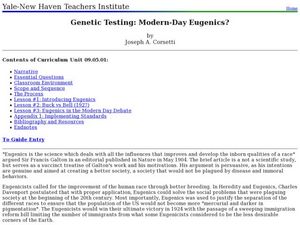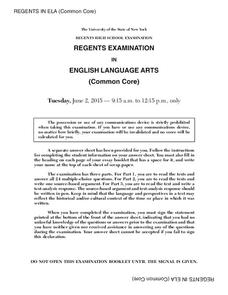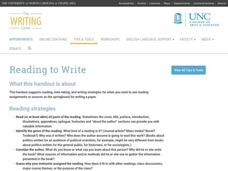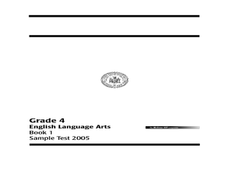PBS
Pass the Past
Prepare your class members for history and geography exams with an educational game that not only tests content knowledge, but also requires students to demonstrate their reading comprehension skills.
Curated OER
Genetic Testing: Modern-Day Eugenics?
Students trace the history of the development of Eugenics. In this social studies lesson, students read and analyze a real life case. They write a paper about what they read.
Curated OER
Mean and Standard Deviation
Get two activities with one lesson. The first lesson, is appropriate for grades 6-12 and takes about 20 minutes. It introduces the concept of measures of central tendency, primarily the mean, and discusses its uses as well as its...
New York State Education Department
English Language Arts Examination: June 2015
Many teachers and districts want to give their pupils test-taking practice before state standardized testing occurs. Here's a resource that features a complete exam with numerous passages, a variety of item types, a conversion chart, and...
University of North Carolina
Reading to Write
Silly journal and essay prompts may be fun to write, but they don't model the kind of writing needed for college papers and standardized tests. The 15th part in a series of 24 covers the concept of reading to write—during and after...
New York State Education Department
Comprehensive English Examination: January 2015
Looking for practice for state standardized testing? Scholars work through a variety of passages and multiple question types in this exam. Questions range from comprehension of auditory passages, reading passages, and poems, as well as...
Curated OER
Reading Comprehension 5: level 11
Use this reading comprehension exercise at the beginning of the year to assess the reading comprehension level of your class, to remind readers of how to use strategies to decode dense text, or to assess the skills of a new student....
Curated OER
Reading Comprehension - Short Stories
Much more than a simple reading assessment, this resource can form the basis of a review of comprehension strategies, as a worksheet that models for readers how to employ strategies to answer questions based on passages, or as a practice...
EngageNY
End-of-Module Assessment Task: Grade 8 Module 6
Test your knowledge of linear functions and models. The last installment of a 16-part module is an end-of-module assessment task. Pupils solve multi-part problems on bivariate data based on real-world situations to review concepts from...
Curated OER
Grade 4 Mathematics Test Book 1
In this grade 4 mathematics test book 1 learning exercise, 4th graders answer 30 multiple choice questions in standardized test format.
Curated OER
Grade 5 Language Arts Test Book 1
In this grade 5 language arts test book 1 worksheet, 5th graders read 4 passages, answer 20 multiple choice comprehension questions in standardized test format, then write a paragraph with supporting details.
Curated OER
Mathematics Test Grade 4 Book 2
In this mathematics test grade 4 book 2 worksheet, 4th graders solve 9 problems in standardized test format and show their work.
Curated OER
Language Arts Book 1 Grade 4 Test
In this language arts book 1 grade 4 test worksheet, 4th graders read 5 passages, then answer 28 multiple choice comprehension questions in standardized test format.
Curated OER
New York State Testing English Language Arts
In this New York State Testing English Language Arts worksheet, learners read passages and answer questions on reading comprehension.
Curated OER
Sentence Completion 6: Low-Advanced SAT Level
Consider using this instructional activity, another in a series of sentence completion exercises, as the basis of a lesson on test taking or comprehension strategies, as a critical thinking exercise, or as extra practice for up-coming...
Virginia Department of Education
Logarithmic Modeling
Explore logarithms and logarithmic regression. Young mathematicians first learn about inverse functions and about the logarithm function family. They take their newfound knowledge to use logarithmic functions to model situations and...
Curated OER
Who wants to win millions: 4th grade addition
Adding large numbers takes practice, so it might as well be fun practice! This Jeopardy-style game asks fourth graders to add up to hundreds, thousands, and millions. A Perfect way to study for up-coming standardized tests.
Scholastic
Study Jams! The Moon
Take your class to the moon and back with this compact slide show. A mix of computer-generated images and photographs are supported by explanatory text. Observers learn about the moon's movements, its physical features, and its phases....
New York State Education Department
TASC Transition Curriculum: Workshop 11
You'll C-E-R a difference in classroom achievement after using a helpful lesson. Designed for economics, civics, government, and US history classes, participants practice using the CER model to craft arguments about primary and secondary...
Science 4 Inquiry
Phases of the Moon
The moon takes just over 27 days to orbit around Earth. Young scientists position themselves as the earth as they rotate around the sun and hold the moon. This allows them to observe the patterns and phases of the moon.
Institute of Electrical and Electronics Engineers
Rotational Equilibrium
Physics stars design mobiles that demonstrate rotational equilibrium. They take measurements and solve related equations for force by graphing, substitution, or determinants. This is a well-developed lesson plan, complete with student...
Scholastic
Study Jams! The Carbon Cycle
Take a ride on the carbon cycle by watching this animated featurette. Those who do will learn about the element carbon, how it cycles through the atmosphere and biosphere, and how it contributes to Earth's temperature. This video comes...
Scholastic
Study Jams! Volcanoes
You will lava this little clip about volcanoes! It explains what a volcano is and describes the four different types. It also addresses how magma flows through a conduit, passes through a vent, and becomes lava. All of this takes place...
NASA
Producers Make Their Own Food
During an inquiry-based lesson, scholars decide which variable to test and then design an experiment to determine the needs of producers. After two weeks, they complete a full analysis and research paper.























